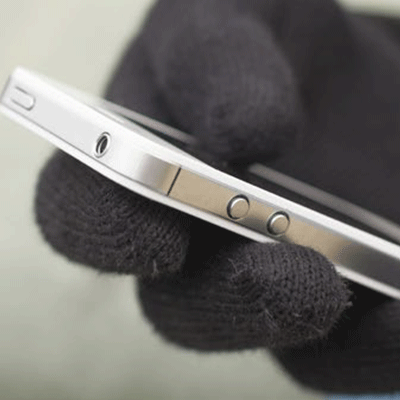 Mobile device theft today is a briskly growing business, and one that carries very high costs and risks for consumers, businesses and retailers alike. Over 1.6 million Americans were victims of smartphone theft in 2013, and consumers worldwide spent an estimated $30 billion annually replacing lost and stolen devices.
Mobile device theft today is a briskly growing business, and one that carries very high costs and risks for consumers, businesses and retailers alike. Over 1.6 million Americans were victims of smartphone theft in 2013, and consumers worldwide spent an estimated $30 billion annually replacing lost and stolen devices.
The secondhand smartphone market – the demand side of the economic equation – is founded on the premise of a great deal on used electronics.
Used iPhones, Android phones and other devices can often be found on Craigslist or eBay for very low prices compared to retail. Consumers who take advantage of these attractive offers, however, often swiftly find themselves in possession of stolen property and left with a new set of complicating headaches.
Stolen phones enter the secondhand market in multiple ways. Most of the time, a device is simply reported to the carrier as stolen or lost and is blocked from service before being resold to an unsuspecting buyer. In some cases, thieves with access will steal phones directly from the manufacturer, contributing both to the high costs of new mobile devices and the risks of receiving their ill-gotten gains. These phones can be wiped, refurbished and resold leaving the secondhand phone consumer left with less money, stolen property and more potential trouble than originally bargained for.
Smartphones intended for use with modern GSM or CDMA networks are today imprinted with an IMEI (International Mobile Station Equipment Identity) or MEID (Mobile Equipment Identifier) number that uniquely identifies the device independently of the SIM card, carrier or subscriber account. When a phone is reported lost or stolen, the IMEI or MEID is typically added to a phone carrier blacklist, and that device can be reactivated for use only by someone in possession of the phone’s original purchase receipt. The person who purchased the stolen phone, meanwhile, is left with no way to use the phone and little recourse for getting their money back.
In addition to the risks of a useless phone, the purchaser now faces several potential legal problems. If they bought it knowing it was stolen, they are now legally in known receipt of stolen property – a crime that, in many jurisdictions, can involve penalties that exceed those of the original theft. If the seller is arrested, they may supply the police with the names and addresses of everyone to whom they sold their phones. And most worrisome, a stolen mobile device purchased secondhand may have been used in connection with criminal activity.
So what should you do if you unknowingly purchase a stolen mobile device? Unfortunately, there is usually not much you can do to recover your money. However, you can minimize the damage and limit the possibility that the transaction could turn into more trouble.
Stop using the device immediately. Tell the police you suspect you’ve purchased a stolen smartphone. Under no circumstances should you ignore the fact that your phone has been stolen. Continuing to use the device after you discover the phone’s illegal status will only increase your odds of being charged with knowingly handling stolen goods. By reporting the phone to the police right away, you also increase the chances that the device may be returned to its rightful owner.
Protect yourself before the sale. If something seems too good to be true, it probably is. Be wary of purchasing a cheap secondhand mobile device from the internet, newspaper or other sources, and always insist on activating the phone with the carrier before handing over any money. Arrange to meet the seller publicly at the carrier’s retail location, so the carrier can immediately check the phone’s IMEI or MEID number against their blacklists. Keep a full record of emails, phone calls, and other documentation of the transaction.
By activating the phone at the retail location prior to the sale, you can also avoid another major source of secondhand phone problem: the post-sale insurance claim. A common practice among less reputable phone sellers is to complete the sale, and then to report the phone as lost or stolen in return for a new phone or insurance payment.
Check the IMEI or MEID yourself before buying. On most modern smartphones, these numbers can be displayed by entering *#06# on the key pad. If this doesn’t work, the IMEI number is usually printed inside the battery compartment, and the MEID number can be found in the about section in the settings app on your phone. Use a trusted third-party service such as CheckMEND to investigate the phone’s history yourself, and to quickly identify warning signs in your intended purchase.
Do your part in cleaning up the market for secondhand phones.
Many smartphones reach the secondhand market legitimately, as device owners seek to sell older models in favor of newer, more feature-rich releases. Listing used mobile devices on eBay or Craigslist, however, tends to increase the market viability of stolen smartphones as well.
Instead, recycle your old devices responsibly with a service that will securely erase, refurbish and dispose of them without the added risks associated with receiving stolen merchandise.
Sims Recycling Solutions provides one such service at our new website, Zombie Phone (zombiephone.com) Offering highly competitive prices for secondhand smartphones, this online outlet includes an automatic check against the CheckMEND database and a fully secure data erasure and electronics reclamation process in compliance with industry best practices.
To learn more about Zombie Phone, our industry partnership with CheckMEND or other Sims Recycling Solutions’ efforts to combat the growing dangers of stolen smartphones, visit the Zombie Phone Website.
